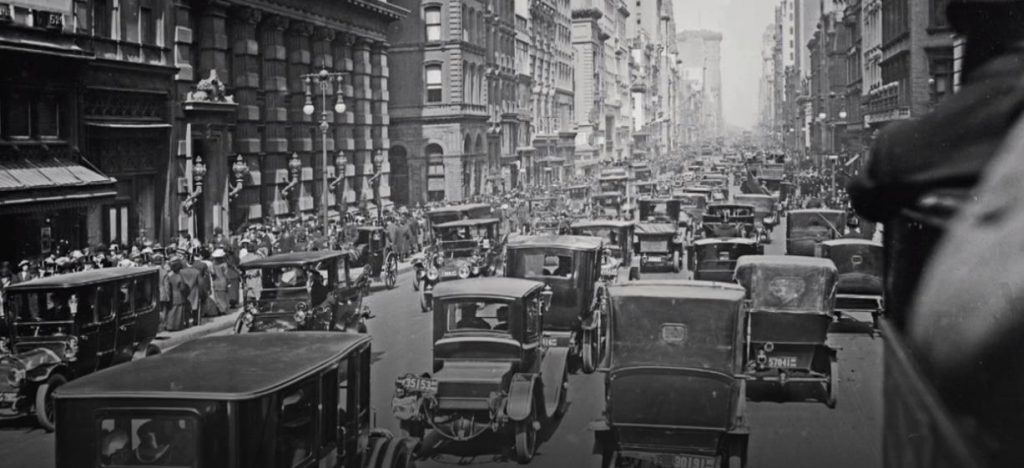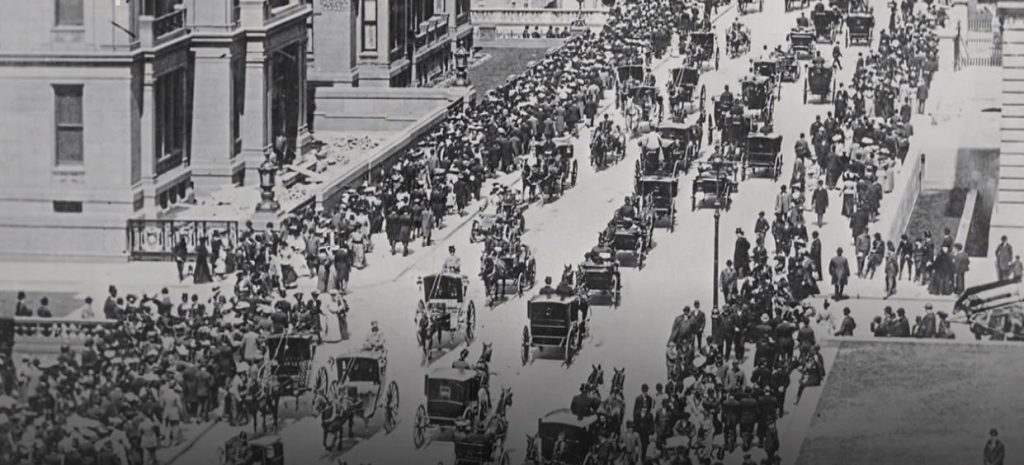The idea of a city without a car seems to be an utopian dream. People are emotionally attached to cars. Electric, autonomous driving offers a wide range of advantages. The urgently needed change will not happen because we need it, but because we want it.
Megatrends have a lasting effect on people, society and the economy. Industrialisation, for example, was one such megatrend. The US researcher John Naisbitt coined this term to refer to social upheavals. Many people migrated to cities as a result of industrialisation. The megatrend ” urbanisation ” will play an even bigger role in the future. By 2030, 5,000,000,000 people will live in cities worldwide. Great challenges are emerging. What will the urban structure of the future look like?
It is estimated that there will be 41 megacities worldwide by 2030. The city of the future should be life-friendly and its inhabitants should use resources sparingly. People will move differently and communicate differently with each other. This changes the character of the city. A special factor is mobility. In 1950, 53 million cars were on the road worldwide, in 1989 there were 555 million. In 2010, the number exceeded the billion mark. Tobias Kurth, Managing Director of Energy Brainpool, talks to Alexander Thamm about the mobility of the future in the format “Megatrends in Dialogue” by BR Alpha. The blog article summarises the most important facts from the interview.
About the future of the electric mobility megatrend
We associate the car with individuality, freedom and unlimited mobility. This is the old nostalgic dream of the automobile. However, the opposite is the case today. In everyday life we are stuck in traffic jams and lose hours of life. The degree of frustration increases due to this unproductiveness. In the city, individual traffic has failed. There are many causes and reasons. One reason is the unattractive local transport.
Is the next change coming?
A fundamental change occurs when three trends occur together. One example: New energy sources, other forms of mobility and modern means of communication have fundamentally changed societies and their economic systems. Renewable energies, electromobility, and digitisation can also lead to fundamental change. One of the last two megatrends, electromobility and digitisation, for example, has led to “car sharing”.
Digitisation is making its way into mobility
Life in Berlin is very easy without a car. S- and U-Bahn make it possible to travel from A to B every minute. For some years now, car sharing has been a new option for getting around in Berlin. Quickly the Smartphone pulled out, the App called and within few seconds the most diverse offerers within a radius of few hundred meters are agreed upon with a large selection at vehicles. The variety of offers ranges from the smallest vehicle to the station wagon and vans. For each purse the suitable vehicle is found, also for customers with little financial means.
Sharing vehicles is an old hat. Car sharing has become a natural part of Berlin’s cityscape. “Thanks to digitalisation, we are pushing ahead with “use instead of own”. The first step is to share vehicles. The next step is “ride sharing”. Consumers who use a vehicle together, for example for door-to-door transport in a minibus, come together here.
Change comes with new applications and traffic reduction
In the future, significantly more people will live in the city. Urbanisation is making significant progress. Individual transport must not make this development parallel. However, the aim is to reduce the number of vehicles on the roads. This development begins with car sharing. Ride sharing can further reduce the number of cars. The breakthrough will succeed if the vehicle can drive autonomously. Then the right vehicle will come to those who need it at that moment. This will reduce the number once again.
Studies show that we only need about 20 percent of today’s vehicles to maintain our current level of mobility. Sharing services will only partially reduce the volume of traffic. Only the combination of different mobility offers can reduce traffic on such a large scale. There is a need for public transport, local transport in the sense of cycling and walking and shared mobility to complement it.
Advantages of electromobility
In the future, cities will become more free and new space will emerge. This development is closely linked to the benefits that e-cars bring. They help to improve air quality and reduce noise levels Today, time is one of the most important resources. If the electric cars then drive autonomously, this will also give people more free time. There will be less congestion if the absolute number of vehicles is also reduced. If all these factors become reality, the overall quality of life will improve. Today, all new vehicles have sensor technology and control technology. Some cars park on their own. Many middle-class cars and well-known electric vehicles from the USA can already drive autonomously. The breakthrough will come.
Change can happen quickly
The promised change sometimes comes faster than expected, is often the statement of visionaries. The emotional attachment to the car is still present in many people’s minds. However, there are many advantages such as safety, cost savings or noise reduction that reduce the complexity of everyday life. Car owners need to be convinced of this: less complexity and a higher quality of life thanks to autonomous, renewable mobility.
The example of the mass motorisation megatrend
Mass motorisation was a megatrend at the beginning of the 20th century. The following example shows how fast the change can take place.
The year 1900. 5th Evenue in New York. Carriages dominate. A car can be seen.
The same picture taken 13 years later. 1913. The same street in New York City.

Figure 2: 5th Avenue with the beginning of the megatrend of mass motorisation 1913 (Source: BR Alpha)
Countless automobiles. And there are only two carriages in the picture.
Find out more about the mobility of the future in the article by Tobias Kurth, who talks about tomorrow’s megatrends in the multi-part series by BR Alpha.
Tobias Kurth in the BR Alpha Serie „Megatrends im Dialog“ – Wie werden wir wohnen? (Min: 10:28 – 16:30)
Market transformation with renewable energies – that has been Tobias Kurth’s focus for more than 15 years. He is Managing Director of Energy Brainpool GmbH & Co. KG from Berlin. Before that, the industrial engineer managed the Europe-wide sales of a medium-sized solar company for sustainable energy products.






What do you say on this subject? Discuss with us!